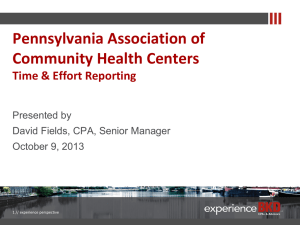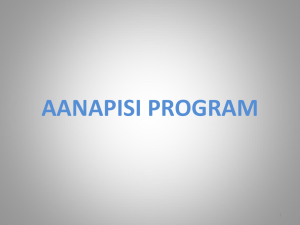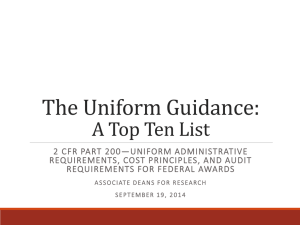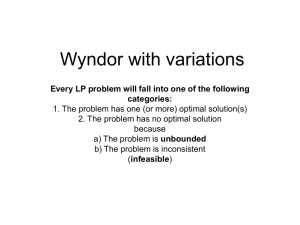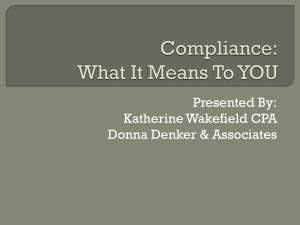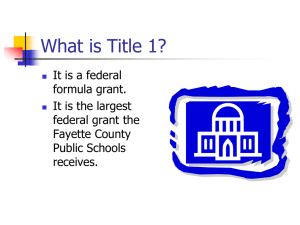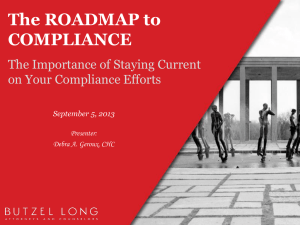Title I Fiscal Responsibilities
advertisement
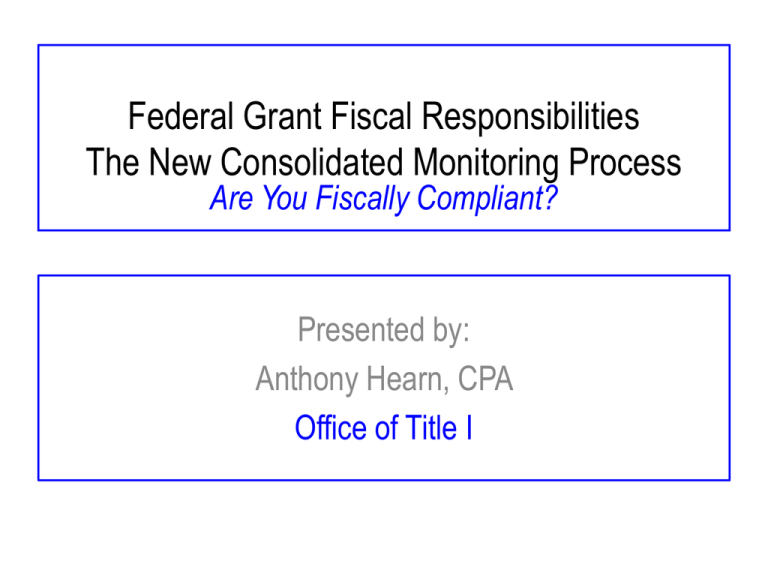
Federal Grant Fiscal Responsibilities The New Consolidated Monitoring Process Are You Fiscally Compliant? Presented by: Anthony Hearn, CPA Office of Title I ED Jobs Consolidated Monitoring New Jersey is required by Government Accountability Office (GAO) to do monitoring of districts spending of federal funds GAO may come out on some visits 65 Districts to be completed by June 2012 PURPOSE: Successful Program Implementation and Proper use of Funds Four Teams in NJDOE ED Jobs, Title I, IDEA, Special Education, Perkins and other NCLB Titles reviewed ED Jobs Consolidated Monitoring All 90 ARRA Monitoring visits are completed and posted on the NJDOE Web Site http://www.state.nj.us/education/arra/resources/monitor/ Ed Jobs Monitoring http://www.state.nj.us/education/finance/jobs/monitor/ Before We Get into Details The following information is being provided as an outreach for the US Department of Education, Office of The Inspector General, as to what can go wrong with grants in the worse case scenarios USDE OIG Hotline • • • • Anyone suspecting fraud, waste or abuse involving Department of Education funds or programs should call or write the Inspector General's Hotline (choose the method of contact which best suits you): Send an email message to oig.hotline@ed.gov Call the OIG Hotline's toll free number 1-800-MIS-USED. The Hotline's operating hours are Monday, Wednesday and Friday 9:00 AM until 11:00 AM, Eastern Time; Tuesday and Thursday, 1:00 PM until 3:00 PM, Eastern Time except for holidays. To ensure complete anonymity, download a hardcopy of the special complaint form, complete, and mail to: Inspector General's Hotline Office of Inspector General U.S. Department of Education 400 Maryland Avenue, SW Washington, DC 20202-1500 OIG Fraud News It really does happen New Jersey—Four Sentenced for Stealing Funds from a Student Government Organization A former office manager for the New Jersey City University Student Government Organization, her husband, and two associates were sentenced for embezzling more than $500,000 from the organization. Between 2007 and 2010, the former Employee issued more than 200 checks from a Student Government Organization bank account made payable to her husband and to the other scheme participants, which they used to purchase goods and services for their own benefit. The former office manager and her husband were sentenced to prison and were ordered to pay more than $516,000 in restitution. The associates were each sentenced to probation and were ordered to pay restitution ranging from $34,300 to $59,000 OIG Fraud News It really does happen Pennsylvania—Former School District Superintendent Pled Guilty to Theft The former superintendent of the Glendale School District pled guilty to theft involving Department and E-Rate funds. The former official misapplied approximately $49,600 from the Fund for the Improvement of Education grant and conspired with others to obtain and misapply more than $414,400 in E-Rate funding. OIG Fraud News It really does happen New Jersey—Two Former Executives of Athletic Equipment Company Charged with Extensive Fraud The former Chief Executive Officer and Chief Financial Officer of Circle System Group were charged with perpetrating a long-running fraud scheme against schools in New Jersey and other States. Circle System Group was a sports equipment and reconditioning company that provides services to school districts, colleges, universities, and professional sports teams nationwide. The two officials allegedly submitted hundreds of fraudulent invoices and other paperwork to schools, sometimes with the knowledge of school purchasing officials, and routinely double-billed schools in an effort to increase Circle System Group sales and revenue. As a result of the double-billing, Circle System Group allegedly received more than $970,000. OIG Fraud News It really does happen FORMER CEO OF CHARTER SCHOOL SENTENCED TO 37 MONTHS ON FRAUD, THEFT AND TAX CHARGES In July 2009, O'Shea entered a guilty plea admitting that he stole between $400,000 and $1 million from PACS by: (1) using approximately $710,000 in PACS' funds to purchase a building in the name of his purported non-profit business; (2) demanding kickbacks from PACS vendors; (3) submitting for reimbursement at least $40,000 in fraudulent invoices for personal meals, entertainment, home improvements, and gas and telephone bills; (4) having approximately $50,000 worth of home repairs improperly billed to PACS; (5) collecting approximately $34,000 in rent from entities using PACS facilities; and (6) hiring a computer firm in an attempt to destroy computer evidence to obstruct this investigation. O'Shea also admitted to filing a false tax return for 2006. OIG Fraud News It really does happen According to the documents filed today in court, THOMPSON was employed at Langston Hughes Academy Charter School as the Business and Human Resources Manager/Financial Manager beginning approximately July 1, 2008 until approximately November 6, 2009. THOMPSON admitted that in her position at Langston Hughes Academy Charter School, she would make cash withdrawals while acting in her capacity as Business and Human Resources Manager/Financial Manager and then manipulated the school’s record in order to conceal the thefts. The amount of loss to Langston Hughes Academy Charter School is approximately $660,000. Initial Contact • Team Leads reach out to contact people listed in EWEG (Usually thru E-mail to set the dates and provide the monitoring tools) • Remember teams are now 7 to 9 people from NJDOE so be easy on us with dates • Follow up letter sent in mail Preparation • General Ledger Reports for 2010-2011 and 20112012 for Title I, NCLB, IDEA and Perkins • Time Sheets for any funded staff • Mainly looking at current year • Special Education Monitors reach out in advance to have IEPs for certain students ready for the visit Preparation • Basic Business Office Documents Board Secretary Reports Position Control Rosters 1512 Reports Standard Operating Procedures TPAF/FICA Reimbursement CAFR Board Minutes for the current school year Preparation – Grant Specific • Title I – Very Programmatic – Be able to identify additional programs in place (that are funded) for low performing students • Other ESEA Title IIA • Will Sample Staff and HQT Status • Review of Professional Development Plan Title III • What additional Programs in place Preparation – Grant Specific • IDEA – Basic fiscal rules and are all items purchased in an IEP • Perkins Equipment listing and tour of equipment Expenses very specific to what is in application Are monies spent in approved areas (CIP Codes) http://www.state.nj.us/education/cte/pubvoc.htm Procurement rules under EDGAR 80.36 apply even if in grant application Common Issues and Resolutions Summary • • • • • • • Financial Management, Procurement and EDGAR 80.36 Time Sheets Equipment Non Allowable Uses of Funds Lack of Identified Programs Lack of Non Public Consultations (IDEA and Title I) Administrative Letter Requirements or Program Requirements System Requirements for LEAs EDGAR §§ 80.20 & 80.36 • Financial Management=80.20 – 7 Key components • • • • • • • Financial Reporting (Ability to Report) Accounting Records Internal Controls Budget Controls Allowable Costs Source Documentation Cash Management System Requirements for LEAs EDGAR §§ 80.20 & 80.36 • Procurement=80.36 – Open competition – Cost/Price Analysis – Vendor Selection – Contract Administration – See Local Finance Notice LFN 2010-3 (1/15/2010), Section I, J and K Time Sheets, PARs, Funded Staff, etc • VERY IMPORTANT to Understand • Need to Show – What they are doing (e.g.: In Class Support) – Where they are doing it (e.g.: Room or Ms. Jones Class) – When they are doing it (e.g.: Time Schedule) OIG Time and Effort Findings • 2006 – Columbus - $2.3 million • 2008 – Detroit - $49 million • 2009 – Houston - $238 million • 2010 – Philadelphia - $123 million 20 Staff Funding What should be in my Board minutes? • Appointment of Teachers • Name Salary School Funding Percentage for Each Program Appointment of Secretaries, Aides, Program Directors, etc. Name Salary Work Location Funding Percentage for Each Program Staff Funding and Time Sheets Fully-funded Salaries Applies to all Fund 20 Federal Grants • Periodic certification signed at least semiannually • Clarification on Funding vs Cost Objective – UGH !!!!!! • Signed by employee and supervisor Staff Funding and Time Sheets Multiple Cost Objectives or Splitfunded Salaries • Personnel activity reports • Signed by employee and supervisor • Must be an after-the-fact distribution of actual activity • Prepared at least monthly and must coincide with pay periods What is a Cost Objective ? • A-87 Definition: A function, organizational subdivision, contract, grant or other cost activity for which cost data are needed and for which costs are incurred. 24 Select Expenditures and Support Needed Equipment • • • • • • Maintain master inventory listing Date, Serial Number, Model, Cost, Location Each school should maintain subsidiary listing All equipment should be labeled with Grant Name or equivalent tracking system Need to keep records for FIVE years past disposition (date needs to be on master list) Even if not equipment for GRANT purposes, if district has a lower threshold, then tracking of equipment is required If less expensive to inventory than to replace, it should be inventoried Non-Allowable Uses or What is Allowable • OMB Circular A-87, Attachment B • Supplanting • Schoolwide – Is it in the Plan ? Selected Items of Cost • Special rules for specific expenses • Still subject to basic guidelines • Examples: – Alcohol: Never allowable – Salaries and Wages: Allowable if time distribution – Meetings and conferences: Allowable if dissemination of technical information – Entertainment !!!!!!!!!! Non-Allowable Uses or What is Allowable • OMB Circular A-87, Attachment B www.whitehouse.gov/omb/circulars/a087/a087_2004.pdf • 1 – Advertising • 14 – Entertainment • 27 – Meetings and Conferences • 34 – Publication and Printing • 43 – Travel Costs Non-Allowable Uses or What is Allowable • Advertising • • • • Advertising and public relations costs. The term advertising costs means the costs of advertising media and corollary administrative costs. Advertising media include magazines, newspapers, radio and television, direct mail, exhibits, electronic or computer transmittals, and the like. The term public relations includes community relations and means those activities dedicated to maintaining the image of the governmental unit or maintaining or promoting understanding and favorable relations with the community or public at large or any segment of the public. The only allowable advertising costs are those which are solely for: (1) The recruitment of personnel required for the performance by the governmental unit of obligations arising under a Federal award ; (2) The procurement of goods and services for the performance of a Federal award; (3) The disposal of scrap or surplus materials acquired in the performance of a Federal award except when governmental units are reimbursed for disposal costs at a predetermined amount; or (4) Other specific purposes necessary to meet the requirements of the Federal award. Non-Allowable Uses or What is Allowable • Entertainment (14) Costs of entertainment, including amusement, diversion, and social activities and any costs directly associated with such costs (such as tickets to shows or sports events, meals, lodging, rentals, transportation, and gratuities) are unallowable. Non-Allowable Uses or What is Allowable • Meetings & Conferences (27) Costs of meetings and conferences, the primary purpose of which is the dissemination of technical information, are allowable. This includes costs of meals, transportation, rental of facilities, speakers' fees, and other items incidental to such meetings or conferences. But see Attachment B, section 14, Entertainment costs. Non-Allowable Uses or What is Allowable • Publication & Printing (34) Publication costs include the costs of printing (including the processes of composition, plate-making, press work, binding, and the end products produced by such processes), distribution, promotion, mailing, and general handling. Publication costs also include page charges in professional publications. • If these costs are not identifiable with a particular cost objective, they should be allocated as indirect costs to all benefiting activities of the governmental unit. Non-Allowable Uses or What is Allowable • Travel (43) General. Travel costs are the expenses for transportation, lodging, subsistence, and related items incurred by employees who are in travel status on official business of the governmental unit. Such costs may be charged on an actual cost basis, on a per diem or mileage basis in lieu of actual costs incurred, or on a combination of the two, provided the method used is applied to an entire trip and not to selected days of the trip, and results in charges consistent with those normally allowed in like circumstances in the governmental unit’s non-federally sponsored activities. Notwithstanding the provisions of Attachment B, section 19, General government expenses, travel costs of officials covered by that section are allowable with the prior approval of an awarding agency when they are specifically related to Federal awards. Select Expenditures and Support Needed General Purchases • • • • • Must have purchase orders Must have account number on P.O. Should indicate Grant on P.O. (Not Just Account #) Signed by Business Administrator If split P.O., Title I should be easily identifiable REMEMBER Title I – Money spent in Individual Schools should EQUAL amount in Step 4 of Eligibility 35 36 Supplement Not Supplant • Funds must be “supplemental” to local spending • Supplemental Defined: “In the absence of federal funds, would funds have been spent (prior year funding is one distinguishing factor)” Supplement Not Supplant • • • • If all students/classroom get items, district can’t pay for Title I / IDEA part out of grant Items purchased should not be used by non-eligible students (can have some incidental benefit, but need to document) Presentations/Trips should not benefit non-eligible students (identify Title I and in IEP for IDEA) Special rules apply to approved and implemented “Schoolwide Programs” Helpful Questions to Ask When Analyzing Costs • Is the proposed cost consistent with federal cost principles? OMB A-87, Attachment B • Is the proposed cost allowable under the relevant program? (Title I, IDEA, etc) • Is the proposed cost consistent with an approved program plan and budget? (EWEG) • Is the proposed cost consistent with program specific fiscal rules? (Supplement not Supplant) • Is the proposed cost consistent with EDGAR? Allowable Costs All Costs must be: • Necessary • Reasonable • Allocable • Legal under state and local law (A5) Allowable Costs • Must be necessary for the performance or administration of the grant • Must follow sound business practices: – Arms length bargaining (hint: procurement processes) – Follow federal, state and local laws – Follow terms of the grant award Schoolwide Program & Expenses MUST have approved plan that addresses all schoolwide issues • Time sheets are required (except in a blended resource fund, e.g., Fund 15 for Abbott districts) • Key questions to be addressed: • – Do the activities budgeted support the intent of the law? [Federal Register: July 2, 2004 (Volume 69, Number 127)] – Are supplemental services provided to the students enrolled in the school? Lack of Identified Funded Programs • Remember when discussing Title I and IDEA, What funded programs are important – We know that the grants do not cover 100% of the necessary programs • Programs for Title I must be clear and distinct • Programs for Title I must be the “icing on the cake” for low performing students • Watch for funded programs that – Are replacement programs (in lieu of math or English) – Pull children away from elective classes Lack of Nonpublic Consultation and Allowable Non Public Expenses • IDEA and Title I have different coverage areas for services to students – Title I – Students that would have attended, but are out of district – anywhere – IDEA – Just resident students • Remember allowable cost rules are the same for Non Public as for Public Schools • If Third Party contractors hired – District needs to maintain plans – Responsibility for all areas should be addressed in the contract – Only allow to bill for actual services, not flat fee monthly Administrative Letters and Requirements • Title I has many administrative components and letter requirements – – – – – – – School in Need of Improvement Letter Parent Involvement Policies (District and School) and distribution Parent School Compacts Parents Right to Know letter for Highly Qualified Staff Title I Annual Meeting SES letters and information posted to web site Entrance and Exit criteria letter to parents • IDEA / Special Education – Document Meetings and specific timelines – See Reports on the NJDOE web site for examples Closing Out the Grants • Must be consistent with budget (amendments filed through EWEG) – EWEG Monitors • CANNOT: – Move more than 10% of total funds without State approval (EWEG amendment) - $50K threshold removed – Add a budget category without State approval (EWEG Amendment) – Transfers to and from Equipment Lines – Carryover more than 15% of Title I total amount received more than once every three years without State approval (Must have good reason) Watch Transfers • Must be able to state WHY transfer and how not SUPPLANTING • Transfers: – Just can’t move expenses to “Use up leftover money” – Make sure consistent with program plans – Can’t move ½ a chair Grants with Restrictions and Reserves • Title I – – – – – Professional Development (SINI and DINI) Parental Involvement Spending by location SES / Choice – Last year If Waiver Approved Non Public Funds Other Important Fiscal Considerations Carryover – Oldest money automatically used first!!!! – Make sure Auditors know so Due to Grantor is not in CAFR, Schedule of Federal Expenditures – started with 2005-2006 Carryover into 2006-2007 Fiscal News from Washington New Haven Audit Report from Office of Inspector General • Supplanting in a Schoolwide Program http://www.ed.gov/about/offices/list/oig/auditreports/a02f0 005.pdf Fiscal News from Washington William Floyd Audit Report from Office of Inspector General • • • • Unsupported Expenses Unsupported Adjusting Journal Entries Supplanting of Textbooks Weak Internal Controls http://www.ed.gov/about/offices/list/oig/auditreports/a02f00 30.pdf Fiscal News from Washington City of Detroit and Parent Involvement Fund 2005 • Disallowed Charges for Entertainment, Promotional Items and Public Relations • Need to be necessary, reasonable, allocable and documented • Disallowed items include advertising for an event and live musical entertainment at parent volunteer function http://www.ed.gov/about/offices/list/oig/auditreports/a05f0018.pdf Fiscal News from Washington City of Detroit Revisit in 2008 • Over $131 Million in 2005 and $126 Million in 2006 • • No Time Sheets – Almost $50 Million Teaching non-Title I students – even though most of Detroit is schoolwide some schools are not (no plan submitted) and OIG looked to these schools and found staff being funded that were teaching nonTitle I identified students. Detroit argued they could have been schoolwide if they did a plan and the OIG rejected this argument Over $21 M for adjusting entries for employees that were charged to other programs and then charged to Title I Gift cards they could not show got to students $150,000 for martial arts training • • • Fiscal News from Washington St. Louis OIG Audit • Lost 125 Computers • Serving Ineligible Schools • http://www.ed.gov/about/offices/list/oig/areports.html Fiscal News from Washington Philadelphia • Findings totaling $138,376,068 • Unsupported Salaries (some direct and some thru adjusting entries) • School Police paid from Title I Funds • Supplanting (moving company, etc) • No backup for School Choice Charges of $1.3M • Weak internal controls Available Research & Where to Find It • No Child Left Behind www.ed.gov/legislation/ESEA02/index.html • Individuals with Disabilities Education Act http://idea.ed.gov/explore/view/p/%2Croot%2Cstatute%2C http://idea.ed.gov/explore/view/p/%2Croot%2Cregs%2C • NJ DOE ARRA Site http://www.state.nj.us/education/arra/ • OMB Circular A-87, Attachment B www.whitehouse.gov/omb/circulars/a087/a087_2004.pdf • EDGAR http://www.ed.gov/policy/fund/reg/edgarReg/edgar.html • Compliance Supplement (A-133) http://www.whitehouse.gov/omb/circulars_a133_compliance_08 _08toc/ Conclusion Remember: • “If the district takes the money, they are responsible for knowing the rules and regulations concerning the grant.” • If you need further help contact Anthony Hearn – (609) 633-2492 – anthony.hearn@doe.state.nj.us
